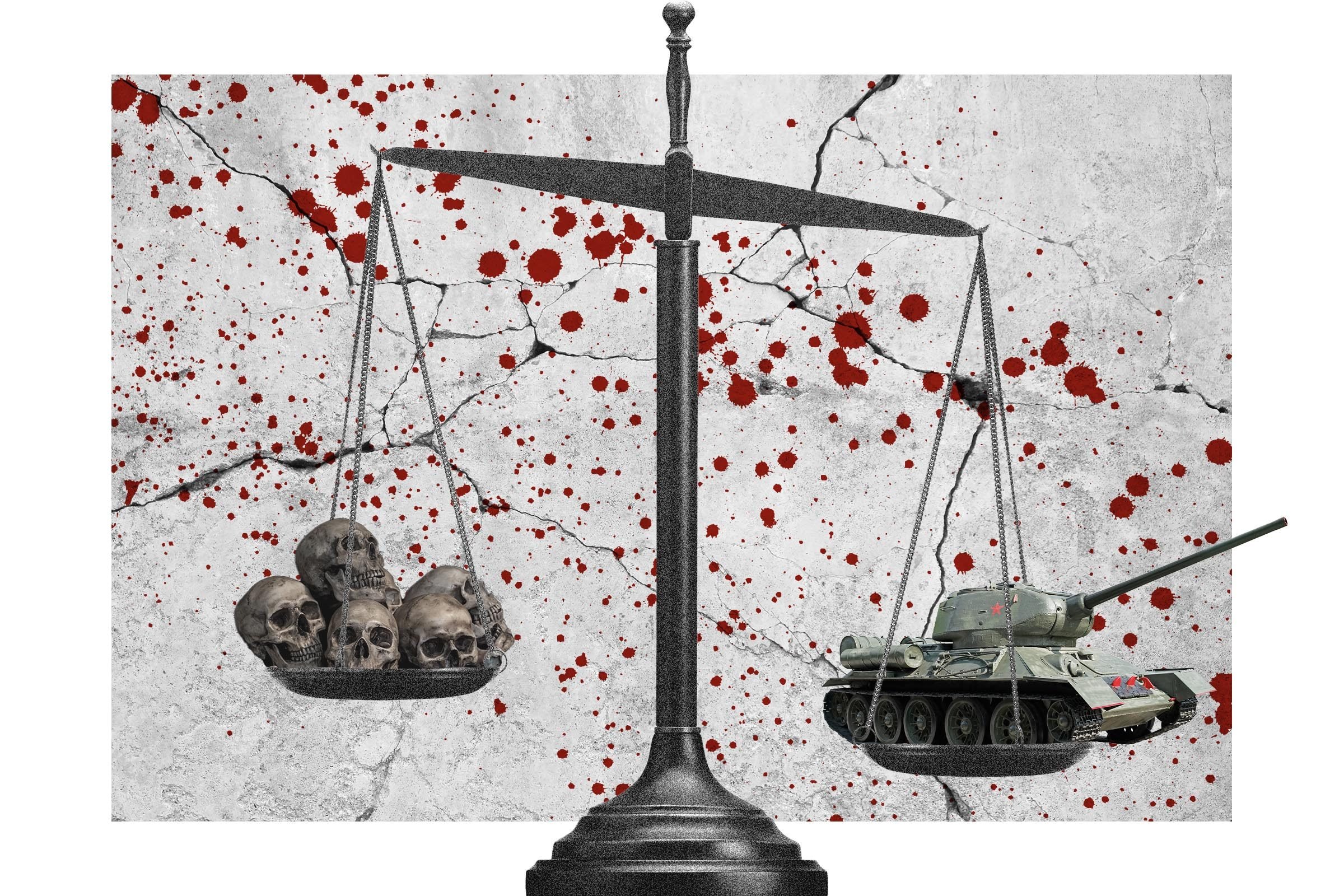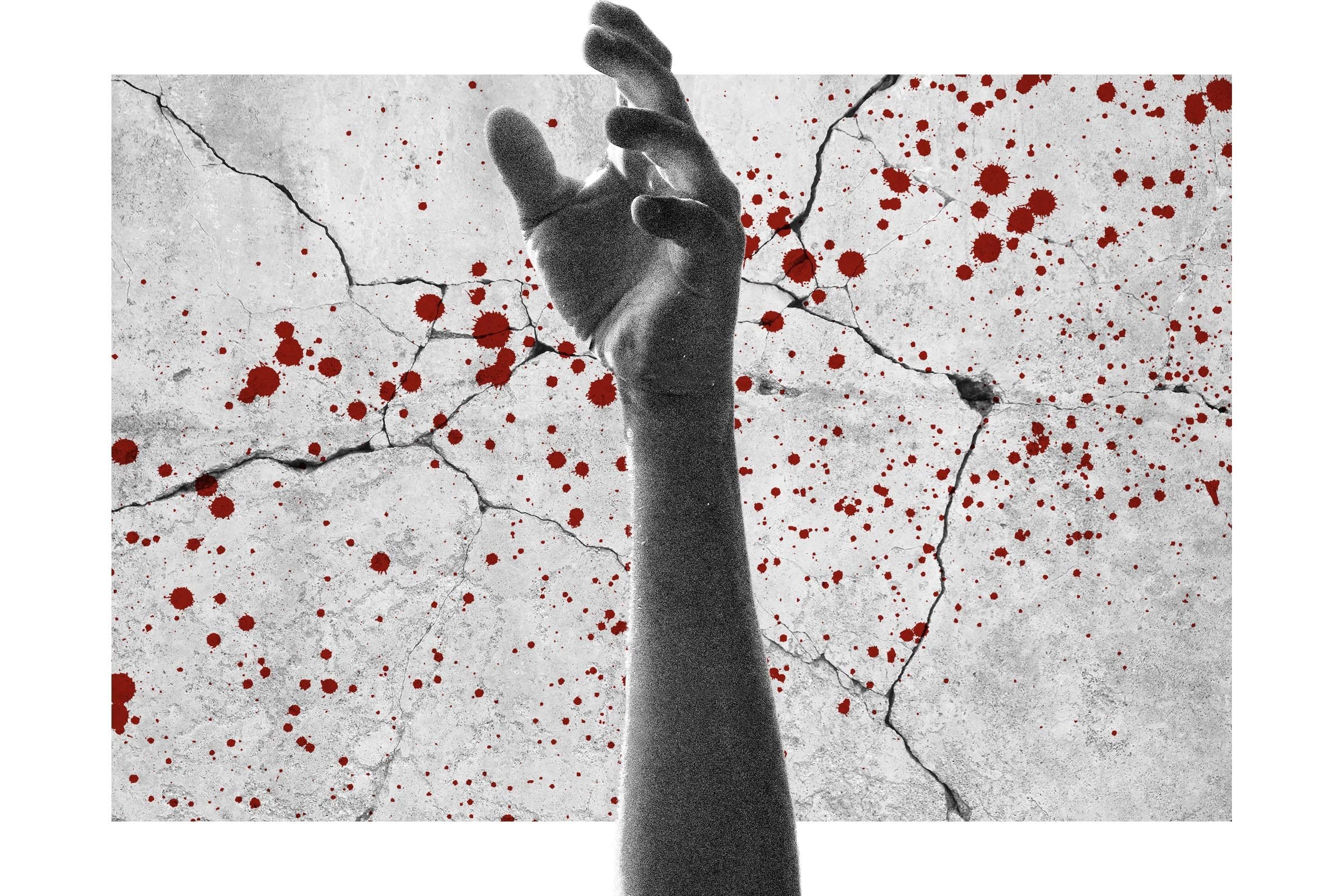What Is a War Crime? And How Are War Criminals Prosecuted?
Updated: Feb. 22, 2023
All war is devastating, but some acts cross the line. Here, we explore what constitutes war crimes—and whether Putin can be held responsible for Russia's brutality in Ukraine.

When historians look back at the Russian invasion of Ukraine, they may debate its most iconic photograph. Will it be the pregnant woman being carried out of a bombed-out maternity hospital in Mariupol while clutching her bleeding belly? Will it be the missile striking a local government building in central Kharkiv in the early days of the war? Will it be the bodies strewn about a trash-filled courtyard in Bucha, all shot at close range and with at least one victim with hands tied behind his back? Will it be the mass graves of Izyum, where more than 400 bodies reportedly reveal signs of torture? All of them show the cost of Russian aggression being paid by Ukrainian civilians. They not only capture the war’s grisly horror and human drama but also present evidence of potential war crimes.
On April 5, 2022, Ukrainian President Volodymyr Zelensky flatly told the United Nations about Russia’s crimes against civilians, including attacks on refugees leaving battle zones, and challenged the international body to live up to its mandate and help Ukraine defend itself from the illegal invasion. Meanwhile the men and women in the Ukrainian military, including volunteers and expats returning to Ukraine, have pushed Russian forces back in the area around Kyiv, only to uncover evidence of atrocities against civilians in towns like Bucha.
“I got criticized for calling [Russian President Vladimir] Putin a war criminal,” President Joe Biden said in an impromptu interview with reporters on April 4. “Well, the truth of the matter—we saw it happen in Bucha—he is a war criminal.” It is rare for any Western leader to be so plainspoken when calling out another leader, but many military law and geopolitics experts argue that it was the right thing to say.
But what Biden said next was a crucial qualifier: “We have to gather the information. … We have to get all the detail [to] have a war crimes trial. This guy is brutal, and what’s happening in Bucha is outrageous.”
Much of what happens in war is outrageous. Much of it is stomach-turning, shocking and horrific. But not all of it is enough to be a war crime. So, what is a war crime, exactly? And what’s the difference between “ordinary” wartime cruelty and a prosecutable offense? We spoke to international policy experts to understand the definition of war crimes and how war criminals are prosecuted.
What is a war crime, exactly?
Captain Willard, the protagonist in the Vietnam War epic Apocalypse Now, said, “Charging a man with murder in this place was like handing out speeding tickets at the Indy 500.” And so it might seem to the average observer. After all, as the saying goes, war is hell. Amid the chaos and carnage, civilians will inevitably suffer alongside the combatants, but this should be avoided as much as possible.
“There are rules that cover the conduct of armies during a time of war,” says Clint Williamson, former U.S. Ambassador-at-Large for War Crimes Issues. “There are certain people who are protected: non-combatants, the wounded, prisoners of war. Certainly, in war, these protected people are sometimes wounded and sometimes killed. That’s called collateral damage, and it’s regrettable, but it’s permitted by the rules of war. What’s not permitted is targeting those protected people.”
The concept of war crimes is less than 200 years old. The first Geneva Convention was signed in 1864, and it was meant to protect wounded and sick soldiers. In 1889 and 1907, those protections were extended to sailors shipwrecked as a result of naval combat. Broader and more stringent protections were offered to civilian populations in 1949 after the devastation inflicted on entire cities and regions during World War II.
Experts, including former U.S. Ambassador to NATO Kurt Volker, warn that if Putin becomes more desperate as battlefield fortunes turn against him, he will become more dangerous and more likely to order war crimes as a means to terrorize Ukraine into submission. International human rights organizations say that’s exactly what happened in Mariupol, the coastal city that was virtually razed to the ground by nonstop, indiscriminate shelling for months before Russian forces finally took control of it.
Which specific acts are considered war crimes?
That type of constant bombing without regard for civilians is just one of the acts specifically deemed a war crime by the Rome Statute, the 1998 U.N. treaty that established the International Criminal Court, or ICC.
While the ICC’s list identifies 50 war crimes, here are some that top the list:
- Genocide
- Torture
- Willful killing of civilians
- Unjustified destruction of property, including educational, religious and historical buildings
- Deportation of civilian populations
- Attacking undefended cities, towns or properties that are not military targets
- Attacking hospitals, medical establishments and medical personnel
- Unjustifiable environmental degradation
- Rape and other forms of sexual assault
- Looting and pillaging
- Intentionally starving civilians
- Taking hostages
Russian troops have been accused, with credible evidence, of all these crimes. However, even though Russia was a founding signatory to the Rome Statute, it “unsigned” the treaty in 2016 after an ICC report classified Russia’s 2014 annexation of Crimea as a military conflict and occupation.
It is illegal to use certain weapons in civilian areas
To minimize the risk to non-combatants, certain weapons have been widely banned, such as cluster bombs, which open in midair over their target and release dozens, or sometimes hundreds, of smaller explosives that can devastate an area bigger than several football fields. Such widespread destruction cannot reasonably be controlled, and some of the bomblets that don’t explode on impact remain a deadly threat to civilians long after the hostilities have ceased. Cluster bombs have reportedly been used by Russian forces in Ukraine, though, notably, Russia and Ukraine—and the United States—are not among the 108 countries that signed the 2008 Convention on Cluster Munitions banning their use.
Another weapon that Russia has been using in Ukraine is the thermobaric, or “vacuum,” bomb. It uses a two-stage explosive technique; the first one creates a large cloud of flammable gas, and the second ignites it. The result is a fireball capable of literally vaporizing people, as well as a shockwave that can pulverize internal organs and an overpressure of 1,000 pounds per square inch that can cause organs to erupt from the body. Though these bombs are not banned outright, under the U.N. Convention on Certain Conventional Weapons, their use in civilian areas can be prosecuted as a war crime.
Deliberate crimes against civilians are prohibited
More disturbing than the arguably “accidental” harm caused to civilians by the use of hard-to-control weapons are the deliberate and willful acts by invading forces that are meant to terrorize, victimize and inflict suffering on the civilian population. These include forced deportations, massacres of civilians and sexual violence, and they have been widely reported throughout occupied Ukraine, along with the destruction of civilian infrastructure, looting and wanton seizure of property.
Whether these acts are intentional and done under the orders of senior commanders or they are the acts of foot soldiers gone rogue, the fact that they are so common throughout Ukraine suggests that blame could reach high levels of the Russian power structure. The doctrine of command responsibility holds that military leaders are liable for crimes committed by their subordinates if they knew or should have known about them and did nothing to prevent or punish them. “It’s very unusual that the individual soldiers—the ‘trigger pullers’ in these crimes—are prosecuted,” says Williamson. “But through something called ‘linkage evidence,’ people up the chain of command can be held responsible.”
Since the end of World War II, the Nuremberg doctrine has made “just following orders” useless as a defense. “Every soldier has an obligation to refuse to follow an unlawful order,” says Leonard Rubenstein, a professor at Johns Hopkins University and the author of Perilous Medicine: The Struggle to Protect Health Care from the Violence of War. “‘Go commit a war crime’ is an unlawful order.” When that unlawful order is carried out, the crime is committed not only by the soldier who followed it but also by the commander who issued it. With sufficient linkage evidence, responsibility for the crime can reach all the way up to the top political leadership.
More Stories About the War in Ukraine
|
Wartime destruction should be “proportional”
“Combatants are obligated not to attack the infrastructure of non-military, civil society,” Rubenstein says. Such targets might include hospitals, water and electrical systems, and civil administration. Each of these, he notes, has been targeted by Russian forces in Ukraine. “It’s not enough to say ‘the military needs electricity or water and therefore these are legitimate military targets.’ There’s a standard called proportionality, which means the destruction can’t harm the civilian population out of proportion to the military goal.”
The attack on Mariupol, which faced near-constant bombardment from the earliest days of the war, is a case study in proportionality. “There [were] Ukrainian soldiers inside Mariupol, defending the city and fighting back against the Russians. But that can’t justify what happened there,” with roughly 90% of the city destroyed, Rubenstein says. In mid-March, a Russian bomb destroyed a Mariupol theater that housed civilians and was marked with the Russian word for “children” to make clear who was sheltering inside; about 300 civilians were killed in that attack. Moreover, attempts to evacuate civilians from the besieged city have been thwarted by Russian refusal to allow relief organizations in to transport refugees to safety.
In November, Russian rockets devastated the civilian infrastructure of Kyiv, leaving almost the entire capital city without power, water and gas for heating. Even though government and military personnel are housed throughout the city, targeted attacks on infrastructure have left civilians without the means to provide food, hygiene and other basic needs. This is sure to draw ICC attention.
Who tries and punishes war crimes?
The Rome Statute, signed by 139 countries since 1998, not only establishes the criminal statutes against war crimes—it also creates the mechanism for enforcing them. For any case brought before the ICC, which moved in 2015 to a permanent building in the Hague, Netherlands, a three-judge panel hears the evidence presented by a prosecutor assigned from the independent Office of the Prosecutor. After a complaint is raised, either by a signatory state or by the invitation of a non-signatory (as Ukraine did after Russia invaded and occupied Crimea in 2014), investigators determine if there is enough evidence to justify an indictment. Once that determination is made, an arrest warrant is issued for the accused. Any signatory state then has authority to arrest the accused, or the home country can arrest and hand that person over to the ICC.
The ICC’s jurisdiction is separate from, but complementary to, national jurisdiction. The home nation of the accused may arrest and prosecute accused offenders. Or, the country where the war crimes were committed may also try and convict the accused if they are foreign citizens. The ICC typically steps in only when the state is unwilling or unable to give the accused a fair and open trial. Theoretically, at some point in the future, Vladimir Putin could be prosecuted in the Hague, Kyiv or Moscow.
When the accused is a high-ranking officer or head of state, the likelihood of an arrest becomes very remote. These people are unlikely to be handed over by their own governments, though it does happen. Williamson notes that when Serbian leader Slobodan Milosevic was first indicted for crimes against humanity in 1999, he was still a popular leader in his home country. But as his political fortunes waned and his people suffered under his leadership, he lost an election in 2000, and a year later, he was delivered to the Hague to stand trial. His trial started in 2002, and he died in custody in 2006, before a verdict was rendered.
Why are war crimes so hard to prosecute?
Despite their hands-on nature, deliberate crimes against civilians can be quite hard to prosecute. That’s because identifying, locating and arresting the culprits responsible can be extremely difficult. After all, with rare exception, those who commit such acts are unlikely to brag about them publicly.
Williamson was part of the 1999 ICC legal team that prosecuted Milosevic, who was tried for promoting the “ethnic cleansing” that led to the attempted genocides in Croatia and Kosovo. Since then, Liberian prime minister Charles Taylor and Iraqi president Saddam Hussein were also prosecuted for war crimes. Taylor was convicted in the Hague for atrocities committed by his troops in the Liberian civil war from 1989 to 1996, and he was sentenced to 50 years in prison. Hussein was tried for crimes against humanity during his nearly 30-year reign in Iraq, and died by hanging in 2006. The command responsibility doctrine held both men accountable for acts occurring under their leadership. The same might hold true for Putin.
“When the crimes are so widespread, like we’ve seen in Ukraine, and appear to establish a pattern meant to terrorize the civilian population, it lends itself to the conclusion that the political leadership was behind the policy,” Williamson says. “When there’s so much day-to-day reporting that crimes are being committed, the political leaders have to be aware of it, and once they know, they’re obligated to put a stop to it. If they don’t, as we’ve seen in Ukraine, they’re presumed to condone the criminal behavior and can be held responsible.”
Williamson says that even the failure to train and educate soldiers on the rules of war can render their commanders liable for crimes committed by the troops. Many of the Russian soldiers captured in Ukraine have said they were lied to about where they were going and not prepared for what they were expected to do there.

Sexual assault adds another complicated layer to prosecution
Some of the most difficult war crimes to prosecute are sexual assaults. In Ukraine, since the start of the invasion, the government has compiled 300 complaints of rape of women and girls by Russian soldiers. Here again, the true number is likely much higher. The stigma attached to these crimes is a powerful tool for silencing the women, and also the men, who survive this brutality. Here, too, there is a great need for skilled investigators.
“Around the world, rape is a common tool of war,” says Payal Shah, director of Physicians for Human Rights (PHR) Project on Sexual Violence in Conflict Zones. “It’s an easy way to terrorize communities, to demoralize civilians. It’s meant to humiliate. It’s meant to cause long-lasting trauma. It’s used as a tool of war precisely because its impact is so profound.”
There are significant institutional barriers that keep survivors from coming forward, which are exacerbated by the chaos of war. But those hurdles can be cleared with committed effort. Shah points to the successful 2017 prosecution in the Democratic Republic of Congo, where 46 rape victims—the youngest not yet a year old—and 18 defendants were identified after an exhaustive effort by police, doctors and human rights organizations including PHR.
“There has been a tendency to normalize sexual assault as a by-product of conflict,” Shah says. “But we have shown that with appropriately trained actors throughout the investigation and judicial process, we can succeed in prosecuting these cases, if that’s what the survivors want.”
Russian communications have inadvertently helped identify war criminals
An aggressive campaign is underway to identify and locate perpetrators of war crimes in Ukraine, and the best witnesses may be the criminals themselves. At the beginning of the invasion, Russian forces disabled much of Ukraine’s civilian communications infrastructure—without understanding that their own encrypted communications systems could not function without that infrastructure. As a result, Russian military command has had to rely on easily intercepted cell phone and walkie-talkie communications. Germany’s intelligence agency says it has intercepted radio communications between Russian soldiers discussing interrogating and then murdering captured soldiers and civilians, clear admissions of war crimes.
“This is a huge opportunity [for gathering evidence] because they’re using the Ukrainian networks, and Ukrainian cell providers have access to all their communications,” say Joanna van der Merwe, an artificial intelligence expert and fellow at the Center for European Policy Analysis. “Quite often, the problem with investigations that rely on this sort of records is getting access to them. Here, we have the Ukrainian government very much in favor of handing over the evidence. And once you’ve got access to that, you can look at the geodata and metadata that can pinpoint who was where, and when.”
She points out how the New York Times used publicly available satellite images and geolocation technology to debunk Russian disinformation about the massacre in Bucha. When Russian officials claimed that the bodies littering the streets in the wake of the Russians’ retreat were placed there by Ukraine to make Russia look bad, the Times was able to show that the victims were killed and left where they lay weeks before the Russians pulled out.
Investigators are receiving a flood of information
In addition, a global network of volunteers have been hacking Russian communications to uncover evidence of war crimes and identify perpetrators. They, along with Ukrainian counterintelligence, have also been able to monitor Russian troop movements in real time through their use of unsecured communication lines. Experts say that’s one reason Russia has lost so many high-level commanding officers in the field.
But van der Merwe worries that the flood of information may overwhelm the investigators and make it hard to find the relevant facts necessary to hold war criminals accountable. The government in Kyiv has opened an online hotline for witnesses to report what they believe are war crimes and is keeping an archive of confirmed reports. “I think that in addition to the military and humanitarian aid that Western countries are providing, there ought to be an effort to provide the investigators who can go through this information and arrest the criminals,” van der Werwe says. On April 4, the EU heeded that call, committing resources to investigate and prosecute these incidents in Ukraine.
Can Putin be prosecuted?
President Biden’s bold accusation that Putin is a war criminal is an important statement, but one that is not terribly likely to have any practical effect. Despite the near-global condemnation of Russia’s alleged barbarity in Ukraine, and mountains of evidence despite Russian denials and propaganda, the likelihood that Putin will be arrested and brought to the Hague is quite low.
“I don’t think anyone should underestimate how difficult it would be to prosecute Putin,” says Williamson. “I don’t think it’s going to happen. But what you accomplish by charging him is further cement his status as an international pariah, and you commit Russia to that hole he has dug for it as long as he’s in power. How can you deal with Russia in the global community when it’s run by war criminals?”
Williamson says that one immediate benefit to declaring Putin a war criminal is to limit his travel to those places where he feels safe from arrest. Already, he is limited to visiting friendly states, like Belarus, which are shrinking in number every day.
There’s plenty of good evidence to indict Putin, starting with his own words, declaring in a rambling speech just before the invasion that Ukraine has no right to independent nationhood. “That suggests that this is a fully premeditated war of aggression,” Williamson says. The number and severity of the criminal acts apparently committed by Russian invaders can’t be denied. Ironically, the Putin-controlled propaganda machine issuing blanket denials further establishes guilt; rather than acknowledge and punish the crimes, which command responsibility requires, Putin chooses to pretend they don’t exist.
Even so, whether to push the criminal case against him may hinge on a far more practical question: Will the threat of prosecution make Putin more likely to escalate the conflict, or will it cause him to find an escape route that allows him to save face? “We just don’t know,” Williamson says.
The United States has a new opportunity to get behind international justice
The common criticism of war crimes tribunals in the global community is that it is merely “victor’s justice,” an after-the-fact justification for war-making or piling punishment on a vanquished foe. But it may provide an opportunity for self-reflection for Western powers that have been hostile to international justice. The United States, for example, is not a member of the International Criminal Court where war crimes are tried. Neither, for that matter, are Russia or Ukraine, but Ukraine invited the ICC to investigate war crimes committed in its territory after the 2014 Russian invasion of Crimea and the eastern region of Donbas, giving the court jurisdiction there.
Williamson says the United States and other Western powers can take this opportunity to reset their commitment to international justice, as well as back off their hostility to the ICC. The United States famously responded to global criticism of the 2003 invasion of Iraq by passing the American Service-Members Protection Act, which included authorizing the president to use “all means necessary and appropriate to bring about the release” of any American held by the ICC for prosecution. Critics called this “The Hague Invasion Act.” Rethinking this position, Williamson says, can allow the United States and the West to reclaim the moral high ground on the issue.
“International justice is far from universal, and it’s far from equitable,” says Williamson. “In the eyes of a lot of critics around the world, the U.S. has not been held accountable for what many people believe were war crimes in Iraq. But there were dozens of prosecutions in the [U.S.] military for rapes and murders, some of them seeking the death penalty. That’s what happens in a country that respects the rule of law.”
So far, Russia has not constrained the crimes we’ve been watching in real time in Ukraine. “If there’s evidence that Putin condoned these crimes, even if he didn’t order them,” Williamson says, “that still makes a compelling argument for pursuing prosecution against him.”
Sources:
- Clint Williamson, former U.S. Ambassador-at-Large for War Crimes Issues
- International Committee of the Red Cross: “Convention (IV) relative to the Protection of Civilian Persons in Time of War. Geneva, 12 August 1949.”
- United Nations: “The Convention on Certain Conventional Weapons”
- Leonard Rubenstein, professor at Johns Hopkins University and author of Perilous Medicine: The Struggle to Protect Health Care from the Violence of War
- International Criminal Court: “How the Court Works”
- Jerusalem Post: “Ukraine claims over 300 cases of rape, sexual violence by Russian forces”
- Payal Shah, director of Physicians for Human Rights (PHR) Project on Sexual Violence in Conflict Zones
- The Defense Post: “Russian Military Phones Hacked: Report”
- Washington Post: “Germany intercepts Russian talk of indiscriminate killings in Ukraine”
- Joanna van der Merwe, an artificial intelligence expert and fellow at the Center for European Policy Analysis
- New York Times: “Satellite images show bodies lay in Bucha for weeks, despite Russian claims”

